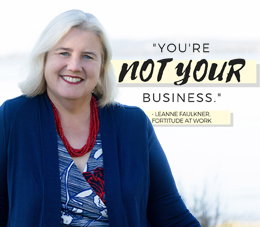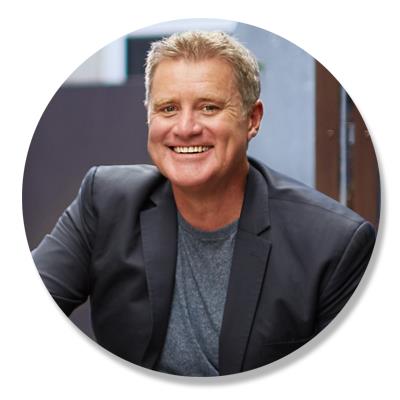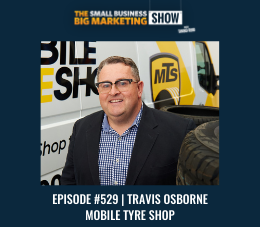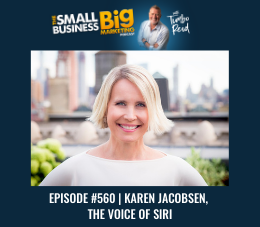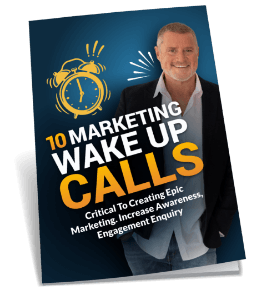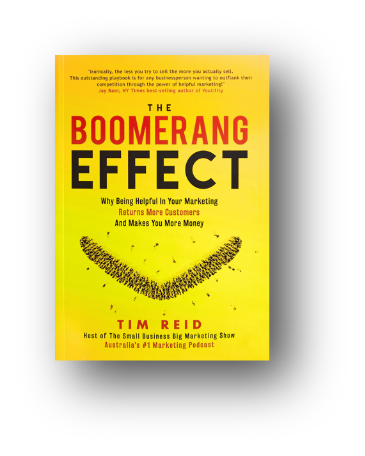Leanne Faulkner launched Billy Goat Soap from her kitchen in response to her son’s eczema. By 2010 she had 20 employees and sold product in over 2000 outlets across Australia. By 2011 Australian retailing had slowed significantly, and this took a huge toll on her mental health. After some time off, she returned to work, selling the business a year later. Today, Leanne is a small business mentor and well-being adviser who has a deep passion for ensuring other small business owners don’t experience the same lows as she did.
There’s loads more tips and insights just like this that will help you build that beautiful business of yours into the empire it deserves to be. Hit the PLAY button above to listen now, or subscribe free to hear the full interview. You’ll also find the full interview transcription below.
Fortitude at Work’s Leanne Faulkner also shares:
- How she grew Billie Goat Soap in to a mini empire
- The highs and lows she experienced in growing the business
- How she managed her way through a mental breakdown triggered by the business
- The signs small business owners should watch out for in regards to managing their mental health
- How to manage adversity in business
- And much, much more
Here’s what caught my attention from my chat with Leanne Faulkner:
- Plan for your health and wellbeing before you need to.
- Talk to someone regularly about how you and your business is going.
- Separate yourself from your business.
Leanne Faulkner Interview Transcription
Tim
I started off by asking Leanne to describe the early days of billy goats soap.
Leanne
Sure, well, billy goat actually started because of one of our kids. So he had eczema. Anyone who has had asthma knows that extra asthma live together, and he had both. And i must have been a bit of a frustrated farmer because we have a few acres on the central coast and i had dairy goats. I don’t know why, but dairy goats is a hobby. And when Liam was born, we just use the usual treatment because there’s five kids in the family, and we thought, well, the older ones have had eczema and normal treatment work for them. But, alas, it didn’t, and it was quite a humbling experience. I went off and did a research, as i have a tendency to do and found out the goats milk soap is supposedly good for people with sensitive skin and just sort of i’ve got goats.
Tim
I’ve got a child with eczema. I’ve got goats
Leanne
I go to learn to make soap now i am not a crafty person in any way. I’m actually fly about making dinner, but for Liam, i thought, i’m going to have a go. So i went and learned how to make soap. And i had some core values that i thought, well, if i’m going to do this, i’m all in so no chemicals, no water had to be milk from my goats and had to be all natural oils. And i guess what ended up happening was i made a lot of really bad soap for a very long time and eventually made something that seemed to help Liam. And that was the start, i guess, of billy goat.
Tim
It’s a common storey that i hear, and great businesses are often born out of personal problems. But i only had a guest on two or three weeks ago. Her name is Saya mcdermott. She was an ex pilot who had eczema, and she, too, could not find a cure. It must be a much personalised, is it a disease or whatever eczema is, it must be very personalised, because one person’s cure is not on others.
Leanne
Yes, and that’s exactly right. And in fact, when i first started with billy goat, i was really only making soap for Liam and for the family. And i did what a lot of people do when they’re in that kind of crafty, in the kitchen going to make candle thing. You know, i just gave it to friends and family for Christmas, and
Tim
Here comes Auntie Leanne. Let me guess it’s a bar of soap?
Leanne
Yeah. And what made matters worse? It was like the very first lots of soap that i made. That was particularly bad soap really so when we actually did perfect the recipe and got to the point where i kind of thought that okay, i’m going to write a strategic plan for this. I remember telling one of my auntie’s about launching the product into health food stores, and-z she was absolutely shocked that i had the tenacity to try and sell something so dreadful. But i had to explain to her that we’ve actually improved a lot since i gave your bar two years ago.
Tim
I’m interested in naysayers, i think there’s a lot of naysayers amongst, you know small business owners were surrounded by them, or you shouldn’t do that, keep your job
Leanne
Exactly, right.
Tim
Was auntie concerned that the soap was just bad and was no good? Or was auntie concerned that you shouldn’t really be going out and being an entrepreneur.
Leanne
Yeah, look, i think it was a bit of both. It was like the product, really. You’re going to go and sell that product, people going to buy it? And so from that point of view, yes, she had quite a lot to say about the worth of the product, but she knew that i had a corporate planning background, and she knew i was a bit of a go together, so there’s probably no stopping me on that front. But it was just she didn’t realise that i actually worked hard on modifying the product, and i use friends and family to give me feedback along the way. So it was really, you know, their words that made it. What it ended up being
Tim
So it was really an animal product, tested on friends and family. Normally, it’s the other way around.
Leanne
It’s exactly right.
Tim
So you got it to market. What did that look like? You’re selling it at the local farmer’s market, or you actually got ranged in a large department store. What happened?
Leanne
No, i started at the local farmer’s market. Like i said, i was a frustrated farmer I was actually a city girl originally, and we moved to a few acres and i fell in love with goat. So i was showing my goats, a gospel show and the woman who organised all the animals that the show had heard that i’d made some soap, and she said i wanted to come and sell it, so i made sure that i was able to do that. I got some insurance and make sure I had my labelling right, and i went off to market. And when i saw that was a bit of a market there. That’s when i sat down and wrote a strategic plan because at that market, i pretty much sold out over that first weekend, and i actually developed a very strategic way of growing the business. So i started working with health food stores first. I quite literally, put soap in my boot and went door to door selling soap. And every time i got a deal and we live up on the central coast. And so every time i’d venture into Sydney to go and sell the product if i sold a box of soap. I would quite literally go back to my car and ring my husband
Tim
You say, darling, we’re cleaning up.
Leanne
Yeah, yeah, that joke he’d love that kind of joke. And he would just say to me that is fantastic. Go to the next door and that’s what i would do. And so really, i spent probably the first two years or so getting to understand how to sell my product into the retail sector and into a sector that was very kind in training and in educating me and, so once i understood that sector, then i plan to move into gift stores, and once i did gift stores, i planned to move into department stores. That’s quite a complex sales process into department stores. On then, once we had really started to work closely with department stores and understood it, then we moved into the very sophisticated pharmacy market. So it was quite a strategic growth process that we had in place for the brand
Tim
Clearly one that worked. But i’m guessing there were a couple of years of rejection in there. Leanne?
Leanne
Oh, lots. Absolutely lots. Particularly with the department stores. I think that the buyers at Myer just thought I was a stalker. Really?
Tim
In what way? Were you relentless?
Leanne
Yeah, i was, i would ask probably about every quarter to six months. I would ask for a meeting. And could i present the range to them? And every quarter or six months, they would very politely tell me no. And i think what probably happened in the end, particularly with myer, was that they just got sick of this girl harassing them and agreed to me coming down to Melbourne and doing presentation. And i remember that day so clearly, because i had this little hang up that, you know, if i was going into a really big deal, i had to wear something red on me for luck. And i remember sitting next to another one of my team members that day, outside the office of the buyer and showing her my red socks and going. I’ve got red socks on today. We’re going to kill it. And we walked in and we did the presentation and we killed it and you know, initially, they gave us ten stores and said, we’re going to just see how you go and this is back in the day when Myer actually had sixty five stores and they said that it generally took around about two years for unknown brand to secure or sixty five stores. And i remember walking out that day going. It’s not going to take me two years and take me less than that and just being really determined about how we would manage that account and we built relationships with the staff in the stores, so they became advocates.
Tim
How did you do that?
Leanne
We spent a lot of time on the ground working specifically with the sales people in the stores with a lot of product training. We did a lot of relationship building, and so what happened for us is when we weren’t in the store because i was little. I don’t have the money to put consultants in every store, but when we weren’t in the store, they would represent us and they would be happy to sell billy goat. So on our behalf, because they believed in the product and we trained. We spent a lot of time doing explaining why the product was we’re selling
Tim
Just out of interest. That’s a fantastic strategy that you’ve laid out there. But how did you then get in front of the staff to do training sessions and to actually occupy their time? Because theyre also responsible for hundreds, if not thousands of other products?
Leanne
When we opened a store, we will put somebody in that store for about the first week, not on a full time basis. I couldn’t afford that. But for about the first week, you say four hours a day in that store, talking to the staff
Tim
Isn’t that harassing?
Leanne
No we would take orders, and we will work at the till
Tim
I think its genius. I’m not criticising. You don’t want others to be able to do the same. You’re in Myers, the biggest department store in Australia. You’re in ten stores. You are deploying a person from billy goat soap to go into a Myer store for four hours and hang out with Myer staff and work behind the counter? Sorry if I’m mr myers. I’m going to go, get out of my store. You’re annoying.
Leanne
No. Mr. Meyer’s going to go. Please come in and do the store display for us and come and do all the point of sale material and come and tell us about the product, because at the end of the day, we have a shared goal, which is to sell the product, right. So i want them to sell the product and they desperately want to sell the product. So we have a shared goal, so they’re very open it. And we were very flexible. So if myer said to us, listen, you know, the only time we can all stand around and talk about your product is at eight o’clock in the morning. Then we will be there at eight o’clock in the morning. Or if they said, we’re going to do it, closing at five o’clock, then we do it at closing. And in fact, when we opened each store, we would send in a bouquet of edible, you know, those edible flower
Tim
Edible blooms
Leanne
We would send them into the counter with a card to the staff in the general cosmetics counter saying, well, were so excited we are here. Thank you so much for your support. And so we actually focused out spend on building a relationship with the staff who we thought would be selling our product when we weren’t there, and that’s what they did. And within the first year, we had all sixty five stores, and the following year we were their supplier of the year in general cosmetics. And we were little billy goat, so we didn’t have a multi million dollar marketing spend budget. But what we did have was a great relationship on the ground, and i cherish that. I really did. I was so proud of that. And to this day i go into stores. I don’t know the brand now, but i go into stores and i still fix the displays.
Tim
Now Leanne great days back in billy goat days. But there were times when you found it difficult and hence your interest in mental health for small business owners. Now, you said to me you’re unable to separate your sense of self from the business so that when the business was failing, you felt you were failing.
Leanne
Yeah. Yeah, that’s exactly right. And in fact, i have to say, Tim, i think it’s only been in the last year or so that people have stopped calling me the goat lady or the soap lady, I clearly get that, and i think that’s probably typical of start ups and small business owners. And we tend to be all in boots and all. And i was quite immersed in the business, and we had rapid growth year on year. But in about two thousand eleven, we were starting to feel the aftereffects of the gfc. And anyone who worked in retail in Australia at that time would tell you that retails slowed significantly. And even though i think was Mr Rad, wasn’t it? Who said i’m going to give everyone hundreds of dollars to go and spend and prop up the economy. Even though he did that, i really don’t think there was one person that woke up and said, oh, my god, i’m going to go on buy soap
Tim
Bought a bigger TV didn’t we?
Leanne
Exactly right as you should, you know. So really even those sorts of things just didn’t help the business. And as the business slowed at that time as retailing in australia slowed and i watch what’s going on now with great interest, then certainly that became very tough for me, and i had to have some very hard conversations with staff, and i had to make some people redundant, and i had to have very big conversation with the bank. And i was fortunate in that i had a bank that had been with me from inception and understood my business extremely well. But so being not able to separate myself from the business, i thought, well, if the business is failing in my allies, if the business is failing, i’m a failure. And quite obviously, everyone else out there in business land knows something that i don’t know so, i had a really bad case of impostor syndrome happening. I think is well
Tim
How did you get through that?
Leanne
I didn’t get through initially, so i would increasingly find myself crying on the way to work. And i’d sit outside my office and try and reapply my makeup so that i looked okay. Well, i got into it, kept max factor in business, got into work and could say hello to everyone and quickly get to my office and close the door and then eventually got to the point I no longer physically able to stay in that office. I just had a knot in my stomach twenty four seven and i couldn’t think of anything else other than work. So i would go to my kid’s football games on the weekend and really not see any goal that they scored. And it’s soccer. So you only get one every forty minutes or something, so really only see, you know, not even see it, because even though my body was on the sideline, my mind was at work. And so i missed probably about three months of my kids’ lives, which i truly regret now, because i’ll never get that back. But i’m very present to them now, so that’s okay, and i only have right now, so I’ve moved on, but i had a knot in my stomach. Couldn’t sleep. I had insomnia and just obsessed about work. So in the end, i physically was unable to go into the office. I had some very dark thoughts at one stage and and would say quite a lot to John. Let’s just close the doors and let’s just forget about it all. And i’m just very fortunate in that i happen to be married to the best man on the planet who had a
Tim
Second best. Sorry
Leanne
I’m sorry Tim, but he’s the best and he has a lot of small business experience and he also happens to have a counselling background. And so he said to me, look before we get to that stage because he’d been home doing or the kid things and i’ve been working and he said, look, why don’t you stay home and i’ll go in and run the business and i was very fortunate because a lot of small business people don’t have that type of sport. He went in and did that. I stayed home and had a breakdown. That was my role at that time and went and sought some help and was eventually able to return to work
Tim
Over what period of time Leanne?
Leanne
Took me about three months. I was unable, physically unable to work.
Tim
The other thing you pointed out when we’re talking previously was you just weren’t investing in yourself. You were the last thing to invest in. If there was any time or resource or money left, you might invest in yourself, which again very flawed thinking, isn’t it?
Leanne
Yeah, absolutely. I know that now. But back then i think i had a sense that if i was investing in myself in any way, that would be a luxury and that, in fact, what i needed to do was just to keep trying harder, which is absolutely flawed thinking because the reality is and i know this now one from the work that i do and also from the research that i do now in this area is i know that the more i invest in myself and that is my general well being, my general health and also my business skills, my knowledge and my ability to connect with others, the more i do that, in fact, the more resilient and capable i am to run a small business and back in those days. And i think that part of the problem was the spiral had gotten way out of control. And i was down in the bottom, so i didn’t actually take time to notice the red flags early on.
Tim
You actually had the breakdown. When you’re running so hard, things break down. So, you know, hard to crawl back. You then took the steps. You got out. You got better. Thank god for your husband. And you sold Billy goat soap?
Leanne
Yes. Ended up selling Billy goat soap. In January of two thousand twelve, we had an exit strategy in mind as part of our business strategy anyway, but we did sell in two thousand twelve, probably a bit earlier or earlier than we had expected to do. But that was a very, very good decision because for two reasons one. It was very good for my well being and my mental health, which was great. But secondly, the brand also needed to move on beyond us. It costs a lot of money to grow a small business, and the brand was ready to go on too much bigger and better markets and bigger and better things. And then it needed a much bigger investor to make that happen. So we made that decision in two thousand twelve and sold the brand.
Tim
So then you’re free to focus. I’m guessing on you call yourself. You became a small business mental health advocate.
Leanne
Yes, that’s right. Well done.
Tim
Why? And what does that involve?
Leanne
Look, i never imagined in a million years that i would be working in the area of mental health, not ever because i was the go getter entrepreneur who was out to do everything. And and it would never expected that i would need to address this area of business. And when i was having my struggles, i would sit at night because, you know, i had insomnia after being diagnosed with situational depression. Then i would sit at night at my computer and type in small business owner and anxiety entrepreneur, not coping, small business owner and depression entrepreneur, feeling stress just to see what was out there, to try and give me some relief. Really. It was about a personal thing, and i was quite shocked to see that there was nothing. Yes, that’s right, nothing for us. And i just thought that was outrageous. And so when you look at it, ninety eight percent of all businesses in Australia are actually small and off those sixty four percent don’t even have employees. We work alone, and i thought it was outrageous that, you know, this large business group of the country actually had no resources, and there was a lot out there. If you are an employee or if you have employees, there’s heaps out there, which is fantastic. That’s great. But my question was, well, what happens if it’s the owner of the business? Like, what do you do if you actually own the business? How do you get help then? And so that kind of set beyond this path to try and change that I guess over the last six years or so, and so i’ve been working in this space, doing a lot with cosboa, which is thie council of small business of australia. We’ve done quite a lot of work banging the drum. I am the sort of person you don’t sit next to me at a networking dinner because this is what i talk about, and you’ll quickly want to change spots with someone else. Really
Tim
I probably think you’re overestimating that. I think it’s very, you know, you’re joking. It’s interesting conversation. It sounds like you package it up in a way that’s quite compelling and inspiring. So before we talk about what is available to small business and if they are experiencing signs of what do we call it? Mental, unwellness what are those signals? The sort of when it is time to reach out?
Leanne
Yeah, look, i think the biggest thing is getting to grappling with that whole notion of just being honest with yourself. So that’s the first thing and then the actual signs to look out for would be things like obsessing over work, just thinking about it. Twenty four seven, so unable to switch off at any time.
Tim
Right now, there’s a whole lot of business owners listening saying that’s me and its normal and that’s just how we roll.
Leanne
Yeah, look, that’s true, but you might want to see it in a combination of other things as well. So there might be things like excessive drinking, stopping any sort of other activities. So it’s really important for small business owners to have some sort of other interests that is not work related. So it might be, i don’t know, playing a musical instrument. It might be photography. It might be being part of a baseball team or whatever something. So the minute you stop doing that because you feel either that you don’t have the time to do it or you just can’t concentrate on it. That can sometimes be a red flag, things like character or demeanour changing. So finding yourself snapping more than you would normally yelling at the kids at home, finding your more short tempered with staff or customers or suppliers might be a sign of stress or anxiety. A change in demeanour around dress or habits, things that you do or you don’t do normally. All of these things crying quite a lot, not coping with the smallest. I think not answering e mails putting your phone on do not disturb twenty four seven not taking calls. Those things are all about avoidance, and that can often be a sign that you might be feeling a bit stressed and anxious. And that’s the time to reach out.
Tim
Leeann you listed a lot of a lot of things there. A lot of different things that business out of my experience. If you’re experiencing one of those things, should you go and seek help? Is it a minimum of three? Is their levels of experience?
Leanne
There is actually no minimum. But certainly there’s a combination of those things. I would regard that as a red flag, but to be really honest Tim, i think deep down inside all of us, we actually do know if we are not coping. And i know for me i started by telling myself i was just having a bad day and get over it. You know, you’re having a bad day and what doesn’t kill you makes you stronger. You know, i would have all the platitudes around to try and get me through it. But then i realised that i was not having a bad day. I was having a bad week, and then before i knew it, i was having a bad month. And i think it’s that type of self awareness that becomes so critical in small business owners. We have to be brave and honest with ourselves that say, listen, yet we do. We all have bad days and we all have stress and stress helps us get out of bed in the morning, and that’s all great. But it’s when it starts to multiply and become a really regular thing that we having to try and actively control in our life be it just drinking in isolation or just obsessing about work and never having downtime. So it might just be one thing. But if it’s becoming obsessive or were increasingly feeling that we can’t cope. That’s probably a red flag.
Tim
It’s a hard one for the business owner in particular, and i don’t want to agree, going and talk, but the business owners, they’re going, but i’ve got a business to run and it’s me. And as you were saying, like, what is it? Sixty four percent of those businesses in Australia are solo entrepreneurs? So how do you take your foot off the pedal? If you take your foot off the pedal and try to get well, then you’re going to come back to a business that ain’t there?
Leanne
Yeah, look, and i understand that completely. And that’s why something called presentism is actually quite rife in small business. And that’s where you get a small business person who goes to work. But they’re really not working at full capacity that they could be doing because they’re just feeling burnt out. But they have to be, you know, the body in the office, really and, there’s a few, and i totally get that. I understand that completely, but i think there’s an opportunity to put some strategies in place that can be done and still be at work. I’ve got two things to say about that. Is it okay if i rattle on about them? Thank you. Okay, so the first is, if you find yourself in that situation, there’s a few things that you could do, which is look at any online resources that are currently available online. So i know that sometimes business owners, finish work at five, go home and then do the books. So if you’re sitting at your computer, in the evening you could go and check out some online resources with some fantastic tips. Twenty four seven. You could do that at any time.
There’s some basic practises that you might want to put in place that you can do easily. That doesn’t mean you don’t have to be away from work, but you can grab time for yourself within work. So find a window of opportunity. And that might be something like going for a walk at lunchtime. So going. You know what? I’m not bringing my luncheon today. I’m going to walk to the local coffee shop and just getting out of the office and going for a walk at lunchtime, it might be having a rule. John and i used to have a rule that said from five thirty on Friday night to eight am on on Monday morning. We are not going to talk, soap and so we actually had that rule. And look, i broke the rule about a million times and john had looked at me and i’d be, oh, that doesn’t work in a broadcast, does it? I put my hand over my mouth and go oops.
Tim
Well, the obvious line there is. If you’re not talking safe, you’re talking dirty. So that’s a great rule. And john were very supportive of that.
Leanne
It’s about actively putting boundaries in place. That don’t mean that you have to give up work. It just means you tweak the work you do, and sometimes it’s those little boundaries and tips and tricks that you can do that can help you in times of great stress and anxiety. Other thing, too, is always remember that there are people out there that will listen to you twenty four seven. So the number that i know, i wish i had a dollar for every time i said this number. I’d be a rich woman, which is lifeline 13114 and small business people can call that number. They will listen to you. You don’t have to be at extreme crisis to call lifeline. You can call them at any time and just say, listen, this is what’s going on for me and do so confidentially, and you can also check into the beyond blue. They haven’t online service, so if you want to just chat to somebody online, have a free service, we can do that. So there’s lots of immediate things you can now do, which is fantastic for small business people. But one of the tools that i absolutely love the most is a pre planning, wellbeing strategic planning tool that is on the Victorian small business commission website. And what that does. It actually encourages small business owners to plan for their general health and wellbeing at a time where there they’ll never need it so often. Its startup or often in a small business. It’s going really, really well, and theY only goes look. We’re track and just fine. Everything’s great. I don’t need anything like that. That’s the time to go into it. A strategic plan around. How are you going to stay well in your business? How are you going to do that? And they asked you a range of things like, do you have someone that you can talk to that will give you unconditional, positive regard? Have you identified that person? You may never need to ever talk to them ever. Great. That’s terrific. But have you written their name down? Just in case. And do they know that they’re going to be your wing man? It asked you to think about how you know if you can’t work, how will you afford not to work? Which is probably the most classic thing that i would say to a small business person who is going really well and tracking well is, do you have income protection, or do you have a little fund put aside that allows you if you need to take a week off, you’ve got a broken leg from football or you’ve got stress and anxiety. So the same kind of thing you need to take time off. Do you have some funds set aside? So you can afford to do that. Then finally, it asked you have you thought about how you would return to work? And have you written out a plan so that, because most of us just need some time off when we get back to work? When you return to work, have you written a return to work plan so that you can do it in a way that doesn’t have you burn out again so you can do it
Tim
And i love the fact that you do it when you don’t need it.
Leanne
Yes, and you do it when you don’t need it. And you know why it’s so great. Because i helped them write it.
Tim if you don’t know what else is going to say i love that you have started a business called fortitude at work. This is what you do now. You are supporting and I thank you for that. Supporting small business owners, particularly your local area where you’re still on the central coast of New South Wales. I love one of the services that you and two locals, which is walk and work where you basically say, listen, let’s catch up for forty minutes and go for a stroll and you can talk to me and i might give you some advice so much as listen. It’s wonderful,
Leanne
Exactly, right? So people can book me for a walk and it’s only forty minutes and yeah, that’s right. I turn up at their business and we head out and we talked business. You know, anything. I could be a sounding board for a great idea that god, i could be a stress relief. They want to talk about how, i don’t know. They miss three busses, and they’re worried about it, and they’ll be all right and i’ll get on track. But they just need to tell someone, just need to get off their chest. That’s the sort of thing that we do often talk about. Or we might talk about some business planning stuff, but it’s the easiest, simplest way. I guess that comes with growing a business in that if you’re active, we actually know that if you’re active out there, then it tends to help trigger some creative thinking because of the endorphins that your putting through your body when you’re exercising and we become quite creative in that state’s it’s actually signed to get legs. If you pardon the pun
Tim
They’re walking right out the door. The packages. Leanne you’re doing great job well done on Billy goat. I know that’s an old story for you now, but i do love seeing a little brand like that, finding its way into being range nationally and so well done for the part you played in that and more importantly, well done to thank you for the part you’re playing in improving the mental health of us small business owners. I know there’s a lot of resource is that people could draw on, and I’m going to get them off you. I’m going to include them in this shownotes. I’m going to include a link to Leanne’s website, which is fortitude at work dot com. Au and let’s see if we can kind of inch forward in making small business owners just that little bit healthier of mind.
Leanne
Terrific. And look, thank you so much, Tim, too, for having this chat and are sharing the story’s and talking about this because that really is the key. More of us talk about the realities of small business ownership. And help that’s out there and support one another. Then we’ll all be successful, so thank you.
Billy Goat Soap founder turned small biz mental health advocate Leanne Faulkner of @FortitudeAtWork shares tips on SME wellbeing https://t.co/CUZ8cfsUTi #mentalhealth #smallbiz
— Timbo ?? (@TimboReid) November 14, 2018
Resources mentioned:
- Billie Goat Soap’s official website
- Leanne’s new business – Fortitude at Work
- Lifeline Australia
- Ahead for Business
- Heads Up – Better mental health in the workplace
- ATO – Small business owners experiencing mental health issues
- Victorian Small Business Commission – Mental health plan
- Safe Work NSW
- Workcover Queensland
Monster Prize Draw
- The winner of this week’s Monster Prize Draw is Mikey J. Langdon from video production company Serious Levity
Jingle of the Week – Spray ‘n Wipe
Please support American Express who make this show possible:
American Express Business Explorer Credit Card
Let your business expenses reward you. Every year.
And join me at the Idea Exchange in Sydney on November 22, 2018.
If something in this episode of Australia’s favourite marketing podcast peaked your interest, then let me know by leaving a comment below.
May your marketing be the best marketing.




